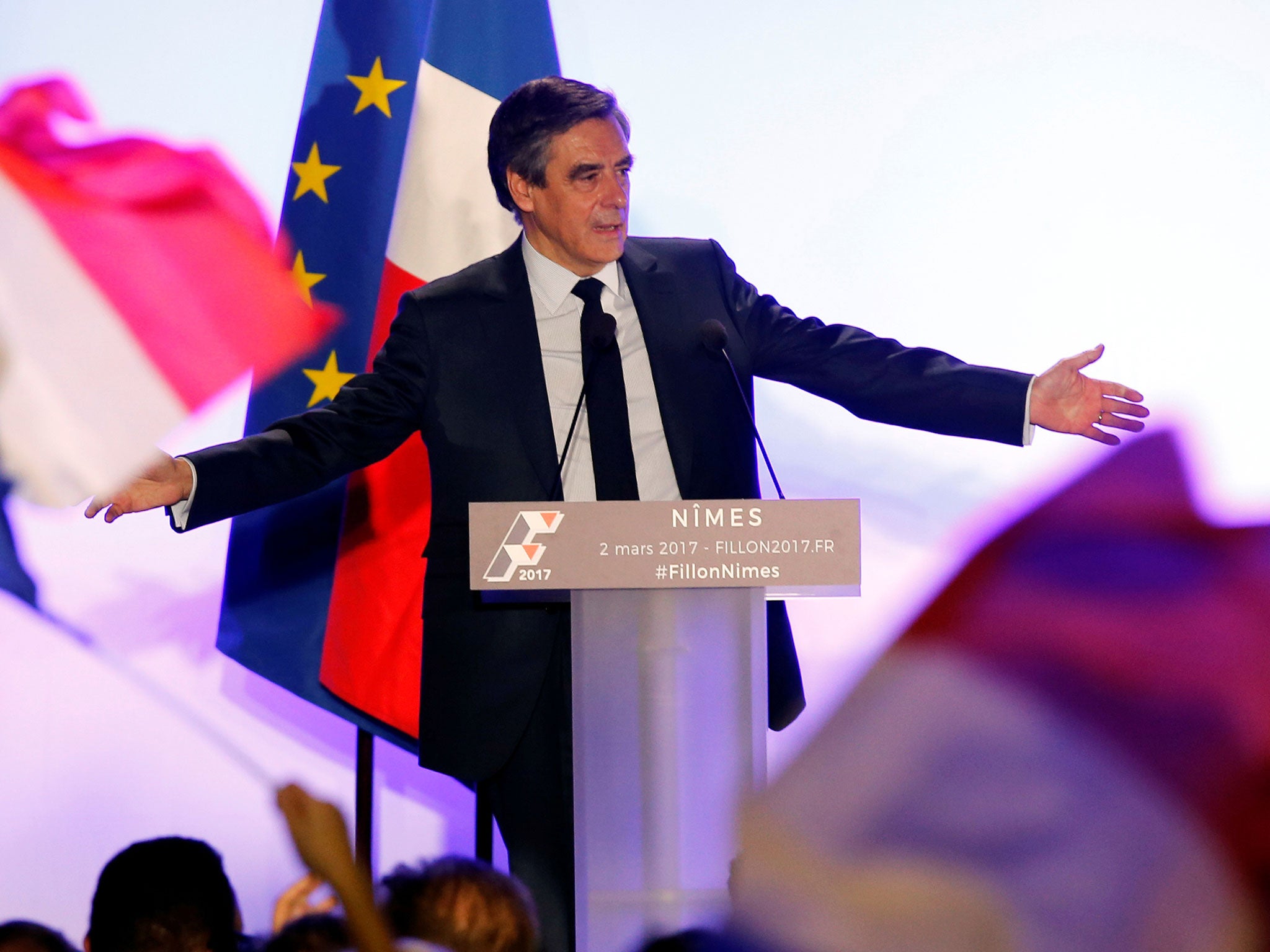If elected, neither Fillon nor Le Pen can be charged with the crimes they're accused of for at least five years
French presidential immunity prevents sitting presidents from being tried for any crime, giving indicted politicians an ulterior motive to stand in an election


Your support helps us to tell the story
From reproductive rights to climate change to Big Tech, The Independent is on the ground when the story is developing. Whether it's investigating the financials of Elon Musk's pro-Trump PAC or producing our latest documentary, 'The A Word', which shines a light on the American women fighting for reproductive rights, we know how important it is to parse out the facts from the messaging.
At such a critical moment in US history, we need reporters on the ground. Your donation allows us to keep sending journalists to speak to both sides of the story.
The Independent is trusted by Americans across the entire political spectrum. And unlike many other quality news outlets, we choose not to lock Americans out of our reporting and analysis with paywalls. We believe quality journalism should be available to everyone, paid for by those who can afford it.
Your support makes all the difference.If you think that British Conservatives belong to the nasty party, then you should see how their French counterparts are acting in the ongoing presidential election campaign. It is with a breathtaking mix of arrogance, cynicism and sheer aggression that the opposition Républicains are trying to muscle their candidate, François Fillon, into the Élysée Palace.
Winning the May poll would mean Fillon becoming the first head of state in French history to enter office as an indicted fraud suspect. He was this week charged with a range of hugely serious offences. Most of them, including embezzlement and hiding assets, come with prison sentences of up to 10 years.
Yet Fillon knows that victory would guarantee him five years of presidential immunity from prosecution. Thus a suspected felon’s hand would hover over the nuclear trigger.
He would command his country’s armed forces, and oversee its security apparatus. A range of quasi-monarchical privileges would allow him to run France as he sees fit, while paying no attention to the laws of the land as they relate to his own misdemeanours.
Fillon would certainly be able to ignore the mountain of evidence which suggests nearly four decades of criminality. It is alleged that he siphoned off more than €1m through setting up bogus jobs for his wife, Welsh-born Penelope Fillon, and their two oldest children, Charles and Marie.
In filmed interviews, both François and Penelope Fillon have in the past stated categorically that Fillon, a self-styled housewife and mother-of-five, did not have any formal job whatsoever. Now the couple are contradicting themselves.
All four Fillons face charges, but deny any wrongdoing. Mrs Fillon admits never having picked up a pass for the Paris parliament, but said she did “discreet” constituency work, such as opening letters at home, and thinking about replies.
Fillon has, in turn, tried to play down the so-called Penelopegate scandal, despite other indicators of extreme extravagance emerging this week. They include him receiving nearly €50,000-worth of handmade suits as “gifts” from an unnamed benefactor. Intriguingly, Fillon’s daughter paid 70 per cent of her parliamentary state-funded salary back into her parents’ joint account. This was to pay for her €33,000 wedding at the family’s rural estate, Marie claims.
Penelope Fillon is also accused of misappropriating another €100,000 through a lucrative contract with the Revue des deux mondes, a literary magazine conveniently owned by a billionaire friend of the Fillons. Mysteriously, the editor of the publication never got to meet Penelope, who produced two short book reviews costed at €50,000 each. The cash came straight from the tycoon proprietor, rather than any editorial staff.
Such details undoubtedly conjure up images of sleaze that Penelope Fillon has struggled to mitigate in the single media interview she has granted since the Penelopegate revelations emerged on January 24th. Yet when news of Francois Fillon’s indictment was made public on Tuesday, he was insouciant. Fillon carried on rambling about a conspiracy against him by politically motivated judges, the media, hidden enemies... anybody who challenged his often surreal defence.
Coming from someone whose party is supposed to be grounded in hallowed Republican principles such as probity, justice and truth, such behaviour, if proven, is unpardonable. It not only exposes the near moral bankruptcy of French conservatism, but also highlights a deep crisis at the very heart of the country’s democracy.
Républicains party members including Fillon say they are inspired by the achievements of great British Tories, from Winston Churchill to Margaret Thatcher. The Fillons are also devout Roman Catholics, and thus take good morals very seriously. When his party colleague, Nicolas Sarkozy, was competing against him in the presidential primary last year while indicted in connection with another case, Fillon presented himself as “Mr Clean” and scathingly said: “Who could imagine General de Gaulle under judicial investigation?”
After Penelopegate broke in late January, Fillon then declared that “there is only one thing that would stop me being a candidate: if my honour was called into question, if I was charged".
This pledge is no longer mentioned, of course. The U-turn was accompanied by Fillon losing the support of his campaign manager, along with that of more than 300 elected officials from the Républicains. The UDI (Union des démocrates et indépendants) – an independent right-wing party – also stopped backing Fillon’s candidacy.
With so many former allies disappearing, Fillon at least hopes to rely on immunity that was clarified by judges at the behest of his former conservative leader, Jacques Chirac. In 1999, the then president obtained a ruling from France’s constitutional Council that allowed him to refuse to answer questions about another fake jobs scandal, and indeed to postpone trial. Chirac insisted that he was upholding the dignity of the presidency, yet on leaving office in 2007, the trial duly took place, and he eventually became a convicted criminal in 2011.
In contrast to other countries, French presidential immunity extends to criminal as well as civil acts. It put men like Chirac above the law so long as he was president. As such, it had the deeply crooked effect of giving lawbreakers a big incentive to remain president. Chirac in fact won a second term – a feat that slowed down the wheels of justice until he was well into retirement.
Now the situation is even more perverse. Fillon wants to become French president in order to stay outside the jurisdiction of French prosecutors. It is the same with the far-right Front National candidate, Marine Le Pen, who faces trial and the possibility of prison for allegedly arranging fictional posts for FN personnel in the European Parliament. Paris judges have also summoned Le Pen over her decision to tweet violent terrorist images displaying dead bodies, but she has refused to attend the hearing.
So it is that both Fillon and Le Pen are styling themselves as anti-system rebels riding roughshod over the rule of law while appealing to “The People” to keep them out of jail. It is an unprecedented turn of events in what increasingly looks like a banana republic, and one which should make the scrapping of presidential immunity an absolute priority.
Join our commenting forum
Join thought-provoking conversations, follow other Independent readers and see their replies
Comments